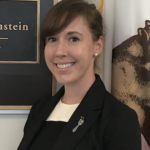As an internal medicine resident, I was fortunate to be able to accompany a leader from my residency program to the American College of Physicians advocacy day in Washington, D.C.—likely because I was on an elective rotation and wouldn’t require coverage. Because of this good fortune, I was able to see firsthand how much our elected officials can learn from interaction with physicians and vice versa.

Dr. Downey
Our group included physicians from every stage in their careers and representing many specialties. While in Washington, D.C., I was able to attend a meeting with a legislative assistant to a member of the House that was particularly eye-opening. One of the issues on our slate that year—which continues to be a subject of discussion—was a lack of residency training slots. When the conversation came around to how the number of training spots is largely influenced by Medicare, the legislative assistant’s response was, “I have plenty of friends who can’t find a job right after law school, and they aren’t asking the government for a handout.” Frankly, I was shocked that the legislative assistant in charge of healthcare issues wasn’t aware that a medical student graduate can’t just go directly into the workforce without completion of residency training.
I share this anecdote not to disparage this particular assistant but to showcase that each and every one of the physicians reading this is already an expert and doesn’t need any special training to be an advocate. After all, advocacy is merely public support for, or recommendation of, a particular cause or policy. All physicians understand the need to train more doctors and the burden that prior authorization and step therapy places on us, our practices and our patients. We all understand that if Medicare reimbursement fails to keep pace with inflation, our ability to care for Medicare patients will be placed in serious jeopardy.
The beginning of 2023 brought the start of the 118th Congress, where 76 legislators were sworn into office for their very first term. (You can use this link to see if your representative or senator is a first-time legislator: https://www.foley.com/en/insights/publications/2022/12/118th-congress-freshmen-members-house-senate.) The influx of new faces in Washington, D.C., marks a great opportunity to establish a relationship with your new member of Congress and help them understand the ins and outs of what it takes to take care of patients.
Many Ways to Connect
One opportunity to do so is through the ACR’s Advocates for Arthritis fly-in held in September. During this event, everything is taken care of—ACR representatives will arrange meetings for you with your representatives and provide a half-day of training to get you up to speed on how you can be the most effective advocate.

